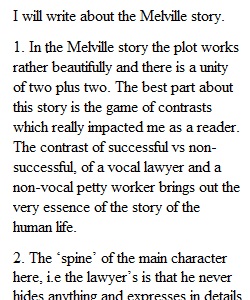


Q Choose either the Oates or the Melville story you read in Module One. Discussion Questions/Prompts: 1. How does the plot work? Does it fulfill that "unifying theory of two plus two" talked about in the TED video about storytelling your viewed in 2.1 ? I.E., How do the elements provided in the work and the order they are placed in engage the audience? What's succeeding in drawing you into the story? 2. What's the "spine" of the main character? (Connie for the Oates story; the narrator for the Melville story-- please note that although you may think Bartleby is the protagonist, it is really the narrator we learn the most about). Review again, if you need to, how the TED video by Andrew Stanton in 2.1 talks about a character's spine: what's the dominant, unconscious goal the main character is striving for? What's the itch they can't scratch that drives all their choices? How do you know? 3. Does the main character ever come to understand what drives their actions? If so, how does that character evolve and learn more about themselves (and others)? If not, why do you think the main character never comes to understand what drives their own actions? What insights about human nature, about human choices and experience, do you come to understand more about as a result of examining this character's spine? 4. How does your understanding of the spine of the character contribute to your understanding of some larger theme or idea that is central to the story itself? In what ways does understanding what drives this character help you think more deeply about your own life or the lives of others? In other words, what is the author trying to tell us about life, humanity, or ourselves through this story? What does the protagonist “learn” through the events and conflicts in this story? If the protagonist doesn’t learn anything, what should s/he have learned? What are some feelings, conflicts, and/or universal human experiences we, the readers, share with the protagonist?
View Related Questions